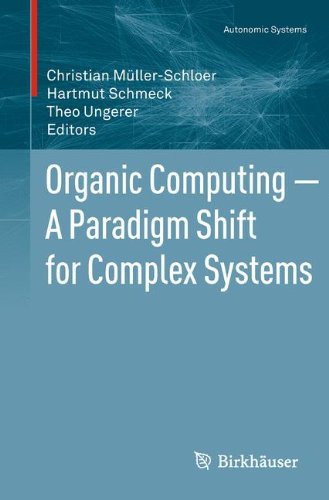

Most ebook files are in PDF format, so you can easily read them using various software such as Foxit Reader or directly on the Google Chrome browser.
Some ebook files are released by publishers in other formats such as .awz, .mobi, .epub, .fb2, etc. You may need to install specific software to read these formats on mobile/PC, such as Calibre.
Please read the tutorial at this link: https://ebookbell.com/faq
We offer FREE conversion to the popular formats you request; however, this may take some time. Therefore, right after payment, please email us, and we will try to provide the service as quickly as possible.
For some exceptional file formats or broken links (if any), please refrain from opening any disputes. Instead, email us first, and we will try to assist within a maximum of 6 hours.
EbookBell Team

4.0
6 reviewsOrganic Computing has emerged as a challenging vision for future information processing systems. Its basis is the insight that we will increasingly be surrounded by and depend on large collections of autonomous systems, which are equipped with sensors and actuators, aware of their environment, communicating freely, and organising themselves in order to perform actions and services required by the users.
These networks of intelligent systems surrounding us open fascinating application areas and at the same time bear the problem of their controllability. Hence, we have to construct such systems as robust, safe, flexible, and trustworthy as possible. In particular, a strong orientation towards human needs as opposed to a pure implementation of the technologically possible seems absolutely central. The technical systems, which can achieve these goals will have to exhibit life-like or "organic" properties. "Organic Computing Systems" adapt dynamically to their current environmental conditions. In order to cope with unexpected or undesired events they are self-organising, self-configuring, self-optimising, self-healing, self-protecting, self-explaining, and context-aware, while offering complementary interfaces for higher-level directives with respect to the desired behaviour. First steps towards adaptive and self-organising computer systems are being undertaken. Adaptivity, reconfigurability, emergence of new properties, and self-organisation are hot topics in a variety of research groups worldwide.
This book summarises the results of a 6-year priority research program (SPP) of the German Research Foundation (DFG) addressing these fundamental challenges in the design of Organic Computing systems. It presents and discusses the theoretical foundations of Organic Computing, basic methods and tools, learning techniques used in this context, architectural patterns and many applications. The final outlook shows that in the mean-time Organic Computing ideas have spawned a variety of promising new projects.